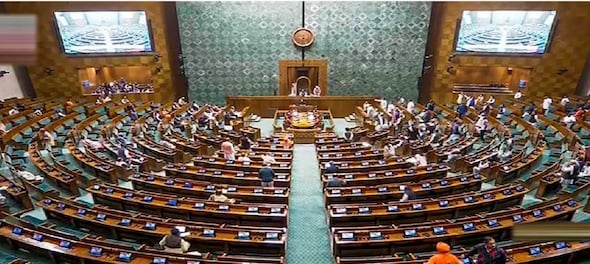
After what was a near-perfect start to the recent Winter Session of Parliament, it ended on acrimonious note with suspension of 146 Members on the grounds of conduct in either of the House to which the Parliamentarians belonged.
The penultimate session, before the country heads to vote for a new government next summer, began with the combined opposition committing to eschew from utilising any tactic to stall the proceedings. The focus was to ensure that limited the opportunity be utilised to extract maximum accountability of the Executive to the Legislature.
Held in the backdrop of the results of the assembly elections to the five states, the mood of the opposition camp was understandably sombre. Members belonging to diverse political parties occupying those benches worked to bring up issues of concern without much interruptions during the first few days of the sittings.
All that changed after the serious breach of security with two people jumping inside the Lok Sabha chamber letting off smoke from canisters. Since then, the combined opposition insisted on a statement from the Union Home Minister Amit Shah.
On his part, Speaker Om Birla iterated that security inside the Parliament premises was the responsibility of the Lok Sabha Secretariat. Steps, he said, were underway to examine the serious incident and come up with a plan to prevent any recurrence. The opposition remained unconvinced and sought the Home Minister’s account in the House. This resulted in a stand-off and as the Opposition raised the demand carrying placards, members faced suspension for ignoring the directions of the Chair and violating the rules.
That the breach of security occurred on December 13, exactly 22 years to date after Parliament was attacked by terrorists was a grim reminder of the challenges that exist. It also exposed the chinks in the arrangements to make the temple of democracy a safe place.
Also Read: Two people jump from visitor's gallery in Lok Sabha, hurl gas-emitting objects | Watch video
In 2001, Parliament resumed its sitting the next day with both the Houses adopting resolutions paying homage to the brave security personnel who lost their lives; condemning the terror attack; and, to unitedly fight the scourge of terrorism.
Then, the following week the Lok Sabha held a discussion under a Rule that did not entail voting which was initiated and replied by the Home Minister L.K. Advani. Prime Minister Atal Behari Vajpayee spoke in the House and lauded the collective will of the nation and parties to stand together. The collective resolve showed that in times of grave challenge, parties rose above partisan considerations. The government worked with the opposition to reassure the country.
The next Budget session of Parliament will be the last and as per practice the outgoing government will present a Vote-on-Account pegged at previous year’s spending mark. This allows the Executive to draw monies from the treasury till a new government presents its own full financial statement.
There are efforts underway to address the concerns of the opposition with the Rajya Sabha Chairman Jagdeep Dhankar inviting the Leader of the Opposition Mallikarjun Kharge for a candid discussion.
Would it lead to a thaw in the otherwise frosty nature of relations between the parties on either side of the divide? On his part, towards the end of the session the Chairman did express his anguish for being a subject of mimicry by a suspended MP.
Also Read: Mimicry row: Ruling MPs attack Kalyan Banerjee, Rahul Gandhi for 'insulting' the Vice President
Parliament and its functioning is designed to allow the Executive to carry on its work with requisite sanctions to effectively govern the country and make laws catering to current and emerging challenges. It is based on the premise that while the opposition can have its say, the government has its way.
Conventions and practices evolved over decades suggest that standoffs on issues, which intensified into days of impasse were eventually resolved through a spirit of accommodation. Even strident postures of constituting Committees to probe into specific issues were conceded to. These trends were more visible since the late 1990s, characterised as the coalition era in Indian politics, It translated into fragmented verdicts forcing parties to work with each other.
On the contrary, a government with clear majority retains greater room to accommodate since its parliamentary managers do not have to worry about counting its numbers when a call to vote is made.
The opposition is an integral part of the arrangement and members on either side of the divide, however marginal, remain the voice of the people. Arguments, counter-arguments and holding contrarian views on issues form the basis of discussions and debates. As the maxim goes, the principal task of opposition is to oppose, expose, and if possible, depose the government.
With political parties entering into the home stretch towards general elections, grandstanding cannot be wished away, yet there should be an effort for a harmonious parting of ways towards the end of the tenure of the 17th Lok Sabha.
—The author, K V Prasad, is a political analyst and writer. The views expressed are personal.
Read his previous articles here
(Edited by : C H Unnikrishnan)
Check out our in-depth Market Coverage, Business News & get real-time Stock Market Updates on CNBC-TV18. Also, Watch our channels CNBC-TV18, CNBC Awaaz and CNBC Bajar Live on-the-go!


Supreme Court dismisses plea seeking postponement of CA exams; details here
Apr 29, 2024 2:29 PM
Just 8% women candidates contested first two phases of Lok Sabha polls
Apr 29, 2024 12:00 PM
The sexual assault case against Prajwal Revanna — here's what we know so far
Apr 29, 2024 11:36 AM
Repolling underway at one polling booth in Chamarajanagar LS segment in Karnataka
Apr 29, 2024 10:32 AM

